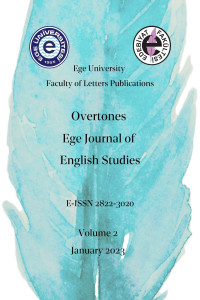Abstract
References
- Anderson, Benedict. Imagined Communities: Reflections on the Origin and Spread of Nationalism, Verso, 1983.
- Bhabha, Homi K. “The Other Question.” The Location of Culture, Routledge, 1994.
- Budhos, Maria. “Questions of Allegiance.” Los Angeles Times Book Review. (2001): 1-17
- Fanon, Frantz. Black Skin, White Masks. Pluto Press, 2008.
- Gandhi, Ashni, “The Glass Palace: A South Asian Memoir of Cultural Cannibalism.” Re:Search: The Undergraduate Literary Criticism Journal 6.1 (2019): 22-35.
- Gellner, Ernest. Nations and Nationalism. Cornell University Press, 1983.
- Ghosh, Amitav. The Shadow Lines. John Murray Publishers, 2011.
- ---.The Glass Palace, HarperCollins Publishers, 2000.
- ---. “India's Untold War of Independence”. The New Yorker (June 23, 1997): 104-111.
- Habib, Irfan. Indian Nationalism: The Essential Writing. Aleph Book Company, 2017.
- Hegel , Georg Wilhelm Friedrich. The Phenomenology of Spirit. Trans. A.V. Miller. Motilal Banarsidass Publishers, Delhi 1998.
- Khilnani, Sunil. The Idea of India. Hamish Hamilton, 1997.
- Mondal, Anshuman, A. Amitav Ghosh: Contemporary World Writes. Viva Books, 2010.
- Macaulay, T. B. ‘Minute on Indian Education’, Selected Writings, edited by J. Clive and T. Pinney (1972): 237–51.
- Mishra, Pankaj. “There'll Always Be an England in India.” The New York Times Company.11, Feb. 2001, pp. 1+.
- Rajalakshmi, N.K. “Mapping the Power of Discourse in The Glass Palace.” Amitav Ghosh: Critical Essays, edited by Bibhash Choudhury. PHI Learning Private Limited, 2016.
- Smith, Anthony D. Nationalism and Modernism: A Critical Survey of Recent Theories of Nations and Nationalism. Routledge, 1998.
- Tharoor , Shashi. An Era of Darkness. Alpha Book Company, 2016.
- Tiwari, Shubha. Amitav Ghosh: A Critical Study. Atlantic Publisher, 2003.
Abstract
The question of nation has always been a problematic one. For the people of the postcolonial countries, the notion of nationhood is more intricate because the colonized mass had continuously been persuaded by the manipulative colonial discourses and colonial hegemony to accept the supremacy of the colonial masters and to abnegate their indigenous culture. This colonial interference has not only troubled the notion of nationhood but also jeopardized the identity formation of the colonized subjects. In The Glass Palace (2000) Amitav Ghosh taking the backdrop of the third Anglo-Burmese war and India’s freedom struggle sheds light on the problematization of the formation of nationhood of Indian soldiers and portrays the psychological dilemma and struggle those Indian soldiers and officers went through in response to the call of duty to rescue their own nation from the grip of the colonizers. Focusing on the major characters of The Glass Palace this paper is an attempt to enquire into the causes how for the colonized mass the concept of nationalism since its inception—being marred by the conflicting ideologies—has turned into an elusive idea and how the identity formation of the postcolonial subjects is always entangled and bifurcated due to the influences of the legacy of colonization.
Keywords
Nation Nationhood Colonial discourse Mimicry Bifurcated identity Nation, Nationhood, Colonial discourse, Mimicry, Bifurcated identity
References
- Anderson, Benedict. Imagined Communities: Reflections on the Origin and Spread of Nationalism, Verso, 1983.
- Bhabha, Homi K. “The Other Question.” The Location of Culture, Routledge, 1994.
- Budhos, Maria. “Questions of Allegiance.” Los Angeles Times Book Review. (2001): 1-17
- Fanon, Frantz. Black Skin, White Masks. Pluto Press, 2008.
- Gandhi, Ashni, “The Glass Palace: A South Asian Memoir of Cultural Cannibalism.” Re:Search: The Undergraduate Literary Criticism Journal 6.1 (2019): 22-35.
- Gellner, Ernest. Nations and Nationalism. Cornell University Press, 1983.
- Ghosh, Amitav. The Shadow Lines. John Murray Publishers, 2011.
- ---.The Glass Palace, HarperCollins Publishers, 2000.
- ---. “India's Untold War of Independence”. The New Yorker (June 23, 1997): 104-111.
- Habib, Irfan. Indian Nationalism: The Essential Writing. Aleph Book Company, 2017.
- Hegel , Georg Wilhelm Friedrich. The Phenomenology of Spirit. Trans. A.V. Miller. Motilal Banarsidass Publishers, Delhi 1998.
- Khilnani, Sunil. The Idea of India. Hamish Hamilton, 1997.
- Mondal, Anshuman, A. Amitav Ghosh: Contemporary World Writes. Viva Books, 2010.
- Macaulay, T. B. ‘Minute on Indian Education’, Selected Writings, edited by J. Clive and T. Pinney (1972): 237–51.
- Mishra, Pankaj. “There'll Always Be an England in India.” The New York Times Company.11, Feb. 2001, pp. 1+.
- Rajalakshmi, N.K. “Mapping the Power of Discourse in The Glass Palace.” Amitav Ghosh: Critical Essays, edited by Bibhash Choudhury. PHI Learning Private Limited, 2016.
- Smith, Anthony D. Nationalism and Modernism: A Critical Survey of Recent Theories of Nations and Nationalism. Routledge, 1998.
- Tharoor , Shashi. An Era of Darkness. Alpha Book Company, 2016.
- Tiwari, Shubha. Amitav Ghosh: A Critical Study. Atlantic Publisher, 2003.
Details
| Primary Language | English |
|---|---|
| Subjects | Literary Theory |
| Journal Section | Research Articles |
| Authors | |
| Publication Date | January 23, 2023 |
| Submission Date | September 22, 2022 |
| Published in Issue | Year 2023 Issue: 2 |


